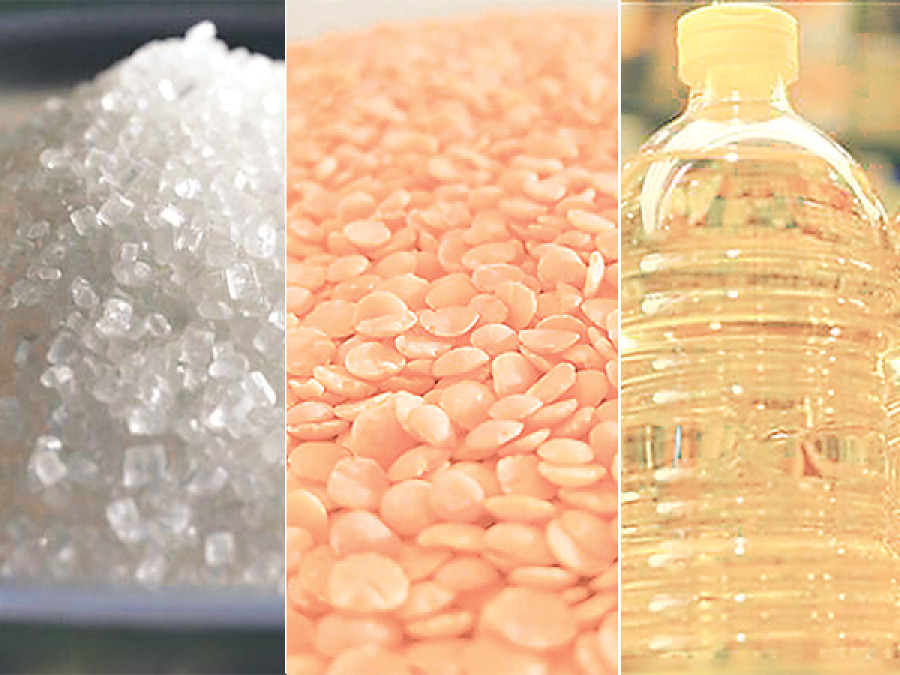Money
Prices swell as blockade, unrest choke off supply
Food prices have spiked across the country due to shortages created by the Indian blockade and prolonged unrest in the Tarai. Retailers have been setting prices arbitrarily and blaming wholesalers for the price hikes.
Suman Bashyal
Food prices have spiked across the country due to shortages created by the Indian blockade and prolonged unrest in the Tarai. Retailers have been setting prices arbitrarily and blaming wholesalers for the price hikes.
Consumers complained that traders had been selling various food items at prices higher than the maximum retail price (MRP). A sharp rise in prices of daily essentials like cooking oil, sugar, pulses, rice, flower and spices has been reported from the Eastern and Western regions besides the Kathmandu Valley.
Soybean oil that used to cost Rs120 to Rs130 per litre a month ago now costs Rs200 to Rs210 per litre in various parts of the country. Similarly, sugar prices have soared to Rs70 per kg from Rs62 per a month ago.
The price of pulses like rahar has almost doubled in the past six months. Rahar, one of the popular products, is being sold at Rs280 to Rs300 per kg, up from Rs140 six months ago. A month ago, its price was in the range of Rs180 per kg.
Similarly, petrol is being sold at Rs300 to Rs500 per litre on the black market, while a cylinder of cooking gas costs up to Rs8,000. As per a new price list published by the Retailers Association of Nepal, mas pulse has soared to Rs250 from Rs190 a month ago. Prices of wheat, corn and millet have increased by Rs5 per kg each. Rice has become dearer by up to Rs200 per sack.
“We have to pay whatever the shopkeepers tell us. They won’t sell us the product if we tell them to charge the actual price,” said Rashmi Lama, a housewife from Bharatpur, adding that they had not been able to buy essential products due to skyrocketing prices. Likewise, another consumer Puja Pokharel complained that prices had soared to record highs, hurting low income people hard. “Almost all the goods have become dearer in the market which is unjustifiable,” said Pokharel.
Baskid Prasad, proprietor of Prapti Grocery Shop in Bharatpur, said that almost everything was in short supply. “Many wholesalers say they are out of stock, and some dealers are charging more, saying that they had brought the goods by paying double the normal transportation cost,” he said.
Chandan Agrawal, proprietor of Riddhi Siddhi Food Store at Narayangadh, said that edible oil and noodles were in short supply in the market, and that his shop had run out of stock a few days ago.
Meanwhile, small grocery shop owners have complained that the local administration raids small shops, but they don’t go to the wholesalers to check hoarding and black marketing.
However, Binod Prakash Singh, chief district officer of Chitwan, said that they had been conducting regular monitoring to prevent black marketing. Singh added that consumers needed to be alert to overcharging. “We will take action against traders who charge more than the MRP, but consumers have to report them to us,” said Singh.
Traders said that they were compelled to bring food items by paying Rs80,000 as transportation charge against Rs20,000 during normal times.
They also complained that the manufacturers themselves had been hiking prices.
However, industrialists said that most factories located in the Tarai region like Biratnagar and Birgunj had shut down due to lack of raw materials and fuel. “Most of the factories are closed, and those that are operational are able to produce only 10-20 percent of the total requirement,” said Kumud Dugar, managing director of the KL Dugar Group, one of the largest manufacturers of rice, oil, pulse and flour.
In Rautahat, traders have been hiking prices stating that they had not been able to import products from India. Most of the food items like rice, pulses and spices are imported from India.
Retailers are selling sugar at Rs90 per kg against Rs65 one month ago. Traders have hiked prices of edible oil, pulses, rice and spices by Rs15 to Rs200 per kg. The price of domestically produced sugar also rose by Rs25 per kg.
Prem Shah, a retailer, said, “Shipments are likely to arrive anytime soon, and I don’t have adequate stock to last me even four days.” Shah added that he had brought some goods from Hetauda by paying more.
The Makwanpur Chamber of Commerce and Industry (MCCI) said that the three-month-long Tarai banda had affected exports and imports. The MCCI, which fixes prices of many goods to bring uniformity in market prices, stated that prices had soared due to the obstruction in supplies.
According to a new price list published by the MCCI, soybean oil costs Rs210 per litre, up from Rs145 on October 5. The price of rice has surged Rs50 to Rs100 per sack, while sugar has risen Rs9 per kg.
“We don’t see any option but to jack up prices as freight charges have risen sharply,” said MCCI Chairman Raj Kumar Neupane, adding that changes in the supply and demand had also contributed to the rise in prices.
(With inputs from Post reporters in Bharatpur, Rautahat, Makwanpur and Sarlahi)




 9.2°C Kathmandu
9.2°C Kathmandu













